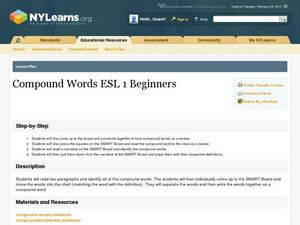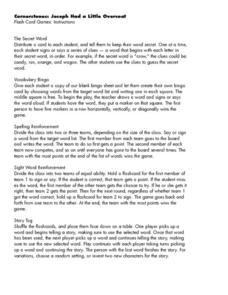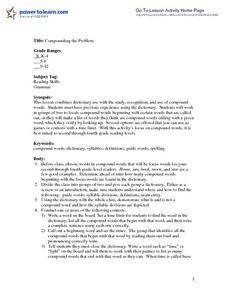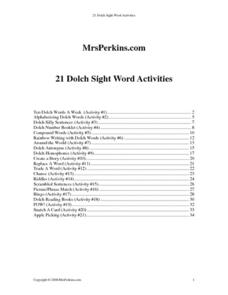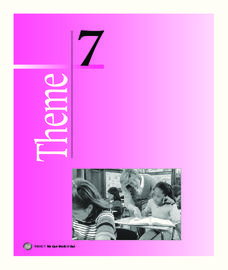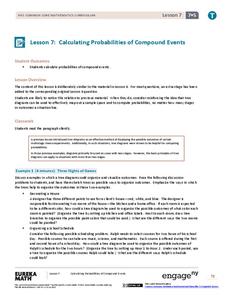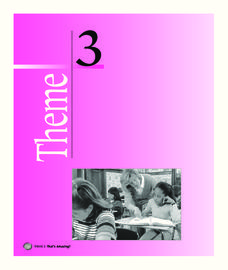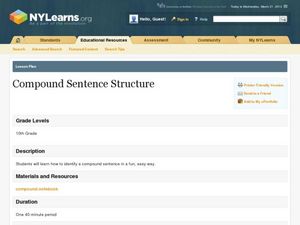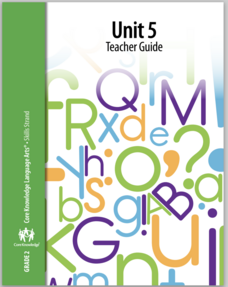Florida Center for Reading Research
Phonics: Morpheme Structures, Compound Word Puzzles
Putting word parts together to make compound words is like working on a puzzle; when two pieces fit together, you know! Invite learners to work with word puzzle pieces to create 12 different compound words. They record their findings on...
Florida Center for Reading Research
Vocabulary: Morphic Elements, Compound Word Trivia
Engage young learners in expanding their vocabulary with a fun game. Scholars learn how compound words provide clues about the meaning of unfamiliar vocabulary. Pairs take turns reading a definition, locating its corresponding compound...
This Reading Mama
Compound Word Pack
Class + room = classroom! And your class + this compound word game = fun and learning! Kids match cards that include words and sometimes images to create compound words.
Curated OER
Compound Word Snakes
Little ones are introduced to compound words. They work with the teacher using word cards to create new compound words out of existing simple words. They then break compound words up to show the two simple words that comprise them.
Curated OER
Compound Words ESL 1 Beginners
Bring vocabulary to life with this SMARTboard activity! With a list of (linked) compound words, learners combine each part of the word to complete the compound word. They then read a narrative and identify the compound words. The last...
PBS
Joseph Had a Little Overcoat: Flash Card Games
Expand the vocabulary of young readers with this series of five activities based the children's book Joseph Had a Little Overcoat by Simms Taback. From playing bingo to group storytelling, a variety of different approaches are presented...
Curated OER
Compounding the Problem
Pupils sharpen their dictionary skills and their understanding of compound words in this plan. Tailor it to the grade level you teach by honing in on specific skills. For older learners, the plan suggests providing a word and having them...
Florida Center for Reading Research
Vocabulary: Morphemic Elements, Root-A-Word
In pairs, scholars draw cards, read the word, and identify its root. Learners place the card on a tree-themed worksheet to sort words by their roots.
Florida Center for Reading Research
Advanced Phonics: Morpheme Structures, Compound Construction
A phonics lesson focuses on morpheme structures—compound words. Pairs choose letter cards, identify a compound word that starts with that letter and write it on a whiteboard. Extension opportunities include additional practice pages.
Curated OER
Compound Words
Second graders match up words together to make compound words. In this compound words lesson plan, 2nd graders also identify compound words when reading.
Mrs. Perkins
21 Dolch Sight Word Activities
Strengthen your pupils' understanding of Dolch sight words with a packet of ideas. Kids can create stories, play bingo, make booklets, compose silly sentences, alphabetize, and much more.
Houghton Mifflin Harcourt
We Can Work It Out: English Language Development Lessons (Theme 7)
Listen, look, speak, and move are the routine steps of the English language development lessons found in a We Can Work It Out themed unit. Language proficiency is reinforced through picture cards, poems, and grand discussions about...
EngageNY
Calculating Probabilities of Compound Events
Use tree diagrams with multiple branches to calculate the probabilities of compound events. Pupils use tree diagrams to find the sample space for probability problems and use them to determine the probability of compound events in the...
Houghton Mifflin Harcourt
That’s Amazing!: Extra Support Lessons (Theme 3)
Follow a teach, practice, and apply routine to provide extra support with a themed unit created by Houghton Mifflin. Topics include compound words, noting details, action verbs, suffixes, compare, and contrast, verbs, fantasy, realism,...
Houghton Mifflin Harcourt
That’s Amazing!: English Language Development Lessons (Theme 3)
That's Amazing! is the theme of an English language development unit created by Houghton Mifflin. Following a speak, look, move, and listen routine, scholars delve into topics; seasons, weather, animals, landforms, telling time,...
Curated OER
Compound Sentence Structure
SMART boards a great way to create interest in any subject - even grammar! Using the provided SMART board lesson plan, have your 10th graders come up to the board and combine two independent clauses using a "glue" word (coordinating...
Houghton Mifflin Harcourt
Nature Walk: English Language Development Lessons (Theme 2)
Walking in nature is the theme of a unit designed to support English language development lessons. Scholars look, write, speak, and move to explore topics such as camping, woodland animals, instruments, bodies of water, things found at a...
Houghton Mifflin Harcourt
Simple and Compound Interest
Your learners will get lots of practice calculating simple and compound interest by the end of this lesson. Simple explanations and examples lead learners through the concepts and steps of calculating simple and compound interest...
EngageNY
Using Tree Diagrams to Represent a Sample Space and to Calculate Probabilities
Cultivate the tree of knowledge using diagrams with two stages. Pupils create small tree diagrams to determine the sample space in compound probability problems. The lesson uses only two decision points to introduce tree diagrams.
Houghton Mifflin Harcourt
Around Town: Neighborhood and Community: English Language Development Lessons (Theme 3)
Here is a unit designed to support English language development. Scholars speak, move, and write to learn more about topics that focus on community and local concepts. The series of lessons aids to reinforce concepts including consonant...
Aquarium of the Pacific
Lego Molecules
Young scientists construct an understanding of molecular compounds in this hands-on science lesson. Using LEGO® to model the atoms of different elements, students build molecules based on the chemical formulas of common compounds.
Core Knowledge Foundation
Second Grade Skills Unit 5: Sir Gus
A unit focuses on second-grade skills, specifically spelling, grammar, writing, and reading. Over six weeks, scholars review spelling patterns and tricky words, and explore verb tenses, adjectives, subjects, and predicates. They write...
BW Walch
Linear & Exponential Functions
Positioned inside the framework of linear and exponential functions, this lesson is more of an investigation into the effects of changing variables and constants inside an expression. The author takes familiar formulas, those for...
University of Missouri
Money Math
Young mathematicians put their skills to the test in the real world during this four-lesson consumer math unit. Whether they are learning how compound interest can make them millionaires, calculating the cost of remodeling their bedroom,...
Other popular searches
- Compound Words Worksheets
- Compound Words Meanings
- Compound Words Hot Dog
- Compound Words Cut and Paste
- Esl Compound Words
- Compound Words 2nd Grade
- Compound Words Lesson Plans
- Compound Word Activities
- Lesson About Compound Words
- Language Arts Compound Words
- Compound Word Machine
- 10 Compound Words Meanings






